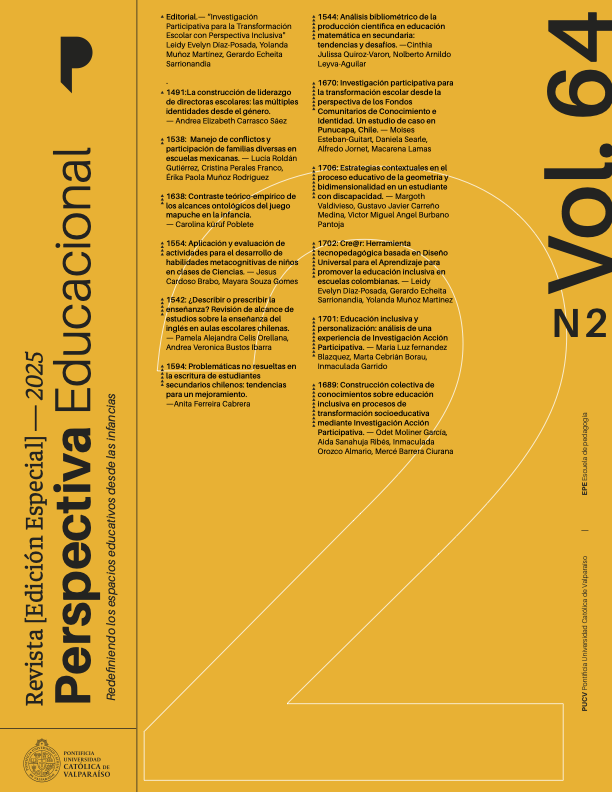Cre@r: Technopedagogical Tool based on Universal Design for Learning for the Promotion of Inclusive Education in Colombian Schools
DOI:
https://doi.org/10.4151/07189729-Vol.64-Iss.2-Art.1702Keywords:
inclusive education technopedagogical tool Universal Design for Learning Design-Based Research participatory researchAbstract
This study stems from opportunities related to inclusive education processes in Colombia, in light of current regulations that –among other aspects– promote the widespread application of Universal Design for Learning (UDL) and prioritize support for students with disabilities, but within the broader framework of improving education for all.
This paper presents the first mesocycle of a Design-Based Research (DBR) study which, following the model proposed by McKenney and Reeves (2012), enabled the design and evaluation –with the participation of 1,096 stakeholders from the Colombian educational context– of the quality and relevance of Cre@r: a techno-pedagogical tool based on UDL that aims at facilitating the progressive development of capabilities required to advance inclusive education in school settings.
Drawing from the microcycles (or stages) of Analysis and Exploration, Design and Construction, and Evaluation and Reflection, an explanatory sequential mixed-methods design (QUAN→qual) was applied to develop the first version of the tool. The design was grounded in the voices of 1,000 stakeholders from the real-world context, who shared challenges and opportunities surrounding the topic.
Subsequently, a group of experts and other participants assessed the overall structure of the design and its 36 specific resources. For the first assessment, a survey was conducted with 37 judges who evaluated the general structure of Cre@r (comprising 4 action areas, 12 components, and 36 associated resources), with accessibility considered as a cross-cutting dimension of the evaluation.
Then, using the focus group technique, various participants explored the resources within each action area and assessed their quality and relevance using four “cardinal points”: Exciting (strengths), Need to Know (missing information), Worrisome (weaknesses), and Suggestions. A total of 57 individuals participated, and the implementation of the technique involved the use of an adapted thinking routine, which helped to energize and organize the data collection process. Once this phase was completed, the information gathered was coded through qualitative content analysis, using the 9 UDL guidelines (version 2.2) as categories.
After presenting the results for each microcycle, the strengths and areas for improvement of Cre@r are discussed in terms of quality and relevance. The discussion emphasizes the importance of DBR as a participatory research model for school improvement. Its implementation is key to generating solutions that concretely contribute to a globally significant issue such as inclusive education.
References
Agencia Europea para las Necesidades Educativas Especiales y la Inclusión Educativa. (2020). Formación docente para la inclusión educativa: Informe resumen final de la fase 1 (A. De Vroey, S. Symeonidou, & A. Lecheval, Eds.). https://bit.ly/46dMNML
Ainscow, M. (2020). Promoting inclusion and equity in education: Lessons from international experiences. The Nordic Journal of Studies on Educational Policy, 6(1), 7-16. https://doi.org/10.1080/20020317.2020.1729587
Ainscow, M. (2025). Un giro inclusivo a la equidad. Desarrollo de sistemas educativos y centros más inclusivos. Narcea.
Aldana-Pulido, D. A., Arias-Quintero, P. A., & Angarita-Reina, F. (2022). Prototipo electrónico BlindTI como herramienta de aprendizaje para niños en condición de discapacidad visual. RISTI - Revista Ibérica de Sistemas e Tecnologías de Informação, (48), 5-22. https://doi.org/10.17013/risti.48.5-22
Baldiris, S., Puerta, Y., Zapata, C., Solano, I., & Treviranus, J. (2024). CO-CREEMOS: A Strategy to Attend Diversity in Colombia. En M. H. Rioux, A. Buettgen, E. Zubrow, & J. Viera (Eds.), Handbook of Disability: Critical Thought and Social Change in a Globalizing World (pp. 797-817). Springer. https://doi.org/10.1007/978-981-19-6056-7_63
Barbour, R. S., & Morgan, D. L. (2017). A new era in focus group research: Challenges, innovation and practice. Palgrave MacMillan. https://doi.org/10.1057/978-1-137-58614-8
Benítez-Turriago, L. A., Bohórquez-Bohórquez, S. C., & Plazas-Hernández, C. Y. (2018). Decreto 1421 de 2017: Derecho a la educación de las personas con discapacidad, entre la norma legal y la voluntad política, perspectiva administrativa y financiera para Bogotá D.C. [Tesis de maestría, Universidad Pedagógica Nacional, Bogotá, Colombia]. Repositorio institucional. http://repository.pedagogica.edu.co/handle/20.500.12209/9866
Booth, T., & Ainscow, M. (2015). Guía para la educación inclusiva: Desarrollando el aprendizaje y la participación en los centros escolares [Adaptación de la 3ª edición revisada del Index for Inclusion, 2011). En G. Echeita, Y. Muñoz, C. Simón, & M. Sandoval (Traducción y adaptación). Fuhem y Organización de Estados Iberoamericanos. https://doi.org/10.15366/reice2015.13.3.001
Carrington, S., Park, E., McKay, L., Saggers, B., Harper-Hill, K., & Somerwil, T. (2024). Evidence of transformative leadership for inclusive practice. Teaching and Teacher Education, 141, Artículo 104466. https://doi.org/10.1016/j.tate.2023.104466
Center for Applied Special Technology. (2018). Universal Design for Learning guidelines version 2.2 [graphic organizer]. CAST. https://bit.ly/42KqACq
Creswell, J. W. (2006). Choosing a mixed methods design. En J. W. Creswell, & V. L. Plano-Clark (Eds.), Designing and conducing mixed methods research (pp. 58-88). SAGE.
Correa-Montoya, L., & Castro-Martínez, M. C. (2016). Discapacidad e inclusión social en Colombia. Informe alternativo de la Fundación Saldarriaga Concha al comité de Naciones Unidas sobre los Derechos de las Personas con Discapacidad. Publicaciones de la Fundación Saldarriaga Concha. https://bit.ly/3dzkwSX
Correa-Montoya, L., Rúa-Serna, J. C., & Valencia-Ibáñez, M. (2018). #EscuelaParaTodos: Panorama y retos del derecho a la educación inclusiva de las personas con discapacidad en Colombia. DescLAB.
Craig, S. L., Smith, S. J., & Frey, B. B. (2022). Professional development with Universal Design for Learning: Supporting teachers as learners to increase the implementation of UDL. Professional Development in Education, 48(1), 22-37. https://doi.org/10.1080/19415257.2019.1685563
Díaz-Piñeres, A., Bravo-Rueda, C., & Sierra-Delgado, G. E. (2020). Educación inclusiva en contexto: Reflexiones sobre la implementación del Decreto 1421 del 2017. Revista Historia Educativa Latinoamericana, 22(34), 265-290. https://doi.org/10.19053/01227238.9823
Díaz-Posada, L. E. (2021). De “Necesidades Educativas Especiales” a “Diseño Universal para el Aprendizaje”: Un recorrido cronológico por las políticas de educación inclusiva en Colombia. Jurídicas, 18(2), 161-182. https://doi.org/10.17151/jurid.2021.18.2.10
Díez-Villoria, E., & Sánchez-Fuentes, S. (2015). Diseño Universal para el Aprendizaje como metodología docente para atender a la diversidad en la universidad. Aula Abierta, 43(2), 87-93. http://dx.doi.org/10.1016/j.aula.2014.12.002
Echeita, G. (2022). Progress, challenges and barriers to the development of more inclusive education. Revista Española de Discapacidad, 10(1), 219-229. https://doi.org/10.5569/2340-5104.10.01.10
Elliott, S. N., Kettler, R. J., Beddow, P. A., & Kurz, A. [Eds.] (2018). Handbook of Accessible Instruction and Testing Practices: Issues, Innovations, and Applications (2º ed.). Springer.
Flórez-Aristizábal, L., Cano, S., Collazos, C. A., Benavides, F., Moreira, F., & Fardounf, H. M. (2019). Digital transformation to support literacy teaching to deaf children: From storytelling to digital interactive storytelling. Telematics and Informatics, 38, 87-99. https://doi.org/10.1016/j.tele.2018.09.002
Gamboa-Palacios, L. Y. (2020). Creación de aulas inclusivas: Una propuesta para la atención de estudiantes con discapacidad intelectual. Foro Educacional, (35), 121-145. http://dx.doi.org/10.29344/07180772.35.2655
Gómez, E. J., Martínez, F. H. S., & Santa, F. (2021). Performance evaluation of two Braille-to-Spanish transcription applications: Mobile device vs. PC. Journal of Theoretical and Applied Information Technology, 99(24), 5920-5933.
Guerrero-Cuentas, H. R., Crissien-Borrero, T. J., & Paniagua-Freyle, R. (2017). Proyectos educativos institucionales colombianos (PEI): Educación inclusiva a través de la autoevaluación. Opción, 33(84), 218-266.
Hargreaves, A., & O’Connor, M. T. (2020). Profesionalismo colaborativo. Cuando enseñar juntos supone el aprendizaje de todos. Morata.
King-Sears, M. E., & Johnson, T. M. (2020). Universal Design for Learning chemistry instruction for students with and without learning disabilities. Remedial and Special Education, 41(4), 207-218. https://doi.org/10.1177/0741932519862608
Lambrecht, J., Lenkeit, J., Hartmann, A., Ehlert, A., Knigge, M., & Spörer, N. (2020). The effect of school leadership on implementing inclusive education: how transformational and instructional leadership practices affect individualized education planning. International Journal of Inclusive Education, 26(9), 943-957. https://doi.org/10.1080/13603116.2020.1752825
Lancheros-Cuesta, D. J., Bohorquez, L., Cortés, L., & Gutiérrez-Villarraga, M. (2018, 13 al 16 de junio). Algebra teaching: An inclusive experience from the information technologies and communications [Conferencia]. 13th Iberian Conference on Information Systems and Technologies (CISTI), Cáceres, España. https://doi.org/10.23919/CISTI.2018.8399333
Linares-Cortés, L. Y., Calderón-Peña, L., & García-Orjuela, E. M. (2019). Una propuesta incluyente, hacia la comprensión oral de estudiantes ciegos y videntes. Foro Educacional, (33), 31-52. https://doi.org/10.29344/07180772.33.2136
López-Jiménez, E. M. (2019, noviembre). Revisión normativa de la inclusión convivencial ante situaciones tipo I y II [Conferencia]. II Convención Internacional de Educación Inclusiva (CIEI), Barranquilla. https://bit.ly/33jbaqO
Love, M. L., Baker, J. N., & Devine, S. (2019). Universal Design for Learning: Supporting college inclusion for students with intellectual disabilities. Career Development and Transition for Exceptional Individuals, 42(2), 112-127. https://doi.org/10.1177/2165143417722518
McKenney, S., & Reeves, T. C. (2012). Conducting educational design research. Routledge. https://doi.org/10.4324/9780203818183
McKenney, S., & Reeves, T. C. (2013). Educational Design Research. En J. M. Spector, M. D. Merrill, J. Elen, & M. J. Bishop (Eds.), Handbook of Research on Educational Communications and Technology (pp. 131-140). Springer. https://doi.org/10.1007/978-1-4614-3185-5_11
Ministerio de Educación Nacional. (2017). Decreto 1421. https://goo.gl/2WmEAB
Moreno-Angarita, M. (2023). Glosario de apoyos educativos y ajustes razonables para garantizar la participación plena de estudiantes con discapacidad: documento de información. UNESCO Office Santiago and Regional Bureau for Education in Latin America and the Caribbean. https://bit.ly/43EyTl1
Muñoz-Martínez, Y., & Porter, G. L. (2020). Planning for all students: Promoting inclusive instruction. International Journal of Inclusive Education, 24(14), 1552-1567. https://doi.org/10.1080/13603116.2018.1544301
Muñoz, P., Escobar, J. M., García, R., & Aguaded, I. (2020). Educomunicación inclusiva y discapacidad en la Región Andina: revisión cualitativa de avances y logros. Revista Complutense de Educación, 32(1), 67-78. http://dx.doi.org/10.5209/rced.68017
Murawski, W., & Scott, K. L. (2019). What really works with Universal Design for Learning. Corwin.
Naciones Unidas. (2006). Convención Internacional sobre los Derechos de las Personas con Discapacidad. https://bit.ly/3dsu4PL
Naciones Unidas. (2015). Resolución aprobada por la Asamblea General el 25 de septiembre de 2015. Transformar nuestro mundo: La Agenda 2030 para el Desarrollo Sostenible. https://bit.ly/39QRagg
Organización de las Naciones Unidas para la Educación, la Ciencia y la Cultura. (2024). The Salamanca Statement Anniversary: 30 Years of Progress? https://unesdoc.unesco.org/ark:/48223/pf0000390459
Pérez-Reyes, P., Castrillón-García, E., & Palacio-Mesa, J. (2018). El currículo como posibilidad de reconocimiento al derecho a una educación inclusiva en Colombia. Revista de investigaciones UCM, 18(32), 12-24.
Radinger, T., Echazarra, A., Guerrero, G., & Valenzuela, J. P. (2018). OECD Revisión de recursos escolares: Colombia [resumen]. Organización para la Cooperación y el Desarrollo Económicos - OCDE [Edición en español realizada por el Ministerio de Educación Nacional de Colombia]. https://bit.ly/2DuX2if
Ramírez, F. M., Aristizábal, L. O., & Latorre, K. K. (2021). Prácticas, discursos y saberes: Una mirada a la educación inclusiva desde la perspectiva de los derechos humanos. Revista Inclusiones, 8(2), 193-200.
Reeves, T. C. (2006). Design research from a technology perspective. En J. van den Akker, K. Gravemeijer, S. McKenney, & N. Nieveen (Eds.), Educational design research (Vol. 1, pp. 52-66). Routledge.
Sánchez-Fuentes, S. (2023). El Diseño Universal para el Aprendizaje. Guía práctica para el profesorado. Narcea. https://doi.org/10.4067/S0718-73782022000200017
Sánchez-Serrano, J. M. (2022). Formación docente en DUA: Revisión sistemática. Journal of Neuroeducation, 3(1), 1-17. https://doi.org/10.1344/joned.v3i1
Simón, C., Muñoz-Martínez, Y., & Porter, G. L. (2021). Classroom instruction and practices that reach all learners. Cambridge Journal of Education, 51(5), 607-625. https://doi.org/10.1080/0305764X.2021.1891205
Vélez-Latorre, L., & Manjarrés-Carrizalez, D. (2020). La educación de los sujetos con discapacidad en Colombia: Abordajes históricos, teóricos e investigativos en el contexto mundial y latinoamericano. Revista Colombiana de Educación, (78), 253-297. http://doi.org/10.17227/rce.num78-9902
Downloads
Published
How to Cite
Issue
Section
Categories
License
Copyright (c) 2025 Leidy Evelyn Díaz-Posada, Gerardo Echeita, Yolanda Muñoz

This work is licensed under a Creative Commons Attribution-ShareAlike 4.0 International License.
The authors grant an exclusive licence, without time limit, for the manuscript to be published in the Perspectiva Educacional journal, published by the Pontificia Universidad Católica of Valparaíso (Chile), through the School of Pedagogy.





